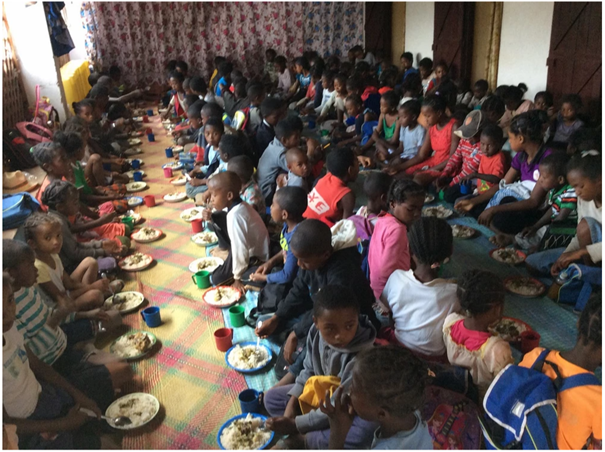FAZASOMA
Ambositra, Fianarantsoa region, Madagascar
DESCRIPTION
SUPPORT OF VULNERABLE POPULATIONS
The purpose of the project is to support children’s education in the Ambositra region by financing school canteens which improve – and sometimes determine – school attendance.
Since its creation in 1999, the mission of Fazasoma France hasbeen to support the most vulnerable people in the province ofFianarantsoa by managing shelters/homes, financing school canteens and providing school supplies, as well as developing income-generating activities.
The current situation in Madagascar is dramatic: 5th poorest country in the world, facing the loss of all tourism resources due to the Covid 19 crisis, and the surge of a dengue epidemy in addition to the spread of Covid 19. The already very vulnerable population is facing a major crisis and needs basic support.
IMPACT / MAIN INDICATORS
• Over 1,000 children in 10 schools served meals in school canteens.
LOCAL
PARTNER
Fazasoma
Selection
Duration
Project selected in September 2017
Multi-year project: 9 years
Financed
by
The Comgest Foundation

COMMENT FROM THE AMBASSADOR

Didier Darré
The core of our action is still to enable children to go to school by covering canteen costs. But FA.ZA.SO.MA also develops more specific projects (creation of a music class in AMBOSITRA, hospital roof repair project) and other long-term projects.
For example, thanks to funding from FA.ZA.SO.MA and Lucienne’s coordination, the MITSANGANA association (which means « Stand Up ») has built and developed a reception center called ZARASOA (which means « Good Luck »). The center provides a home with accommodation for the poorest children living around Ilaka (a small village in the highlands 280km south of the capital Antananarivo). The development also includes a house for the janitor, a kitchen, a henhouse and rabbit hutches, a barn with a cow (that has just given birth), a vegetable garden, a guest house (rental of which brings income and enables exchanges with people passing through), a plantation of fruit trees and a garden for the children, a well providing access to water for the whole village, an underground tank to collect rainwater, a rice field for cultivation and resale, and a rice hulling machine (also used by the villagers) and which has proved immediately self-sufficient by providing two jobs.
The aim is to instil in the children a sense of autonomy, shared responsibility and mutual support. After training in the management of livestock and various crops, the older children are already talking about the prospect of work. This is a source of hope for them and their community and gives us encouragement to continue our work.
